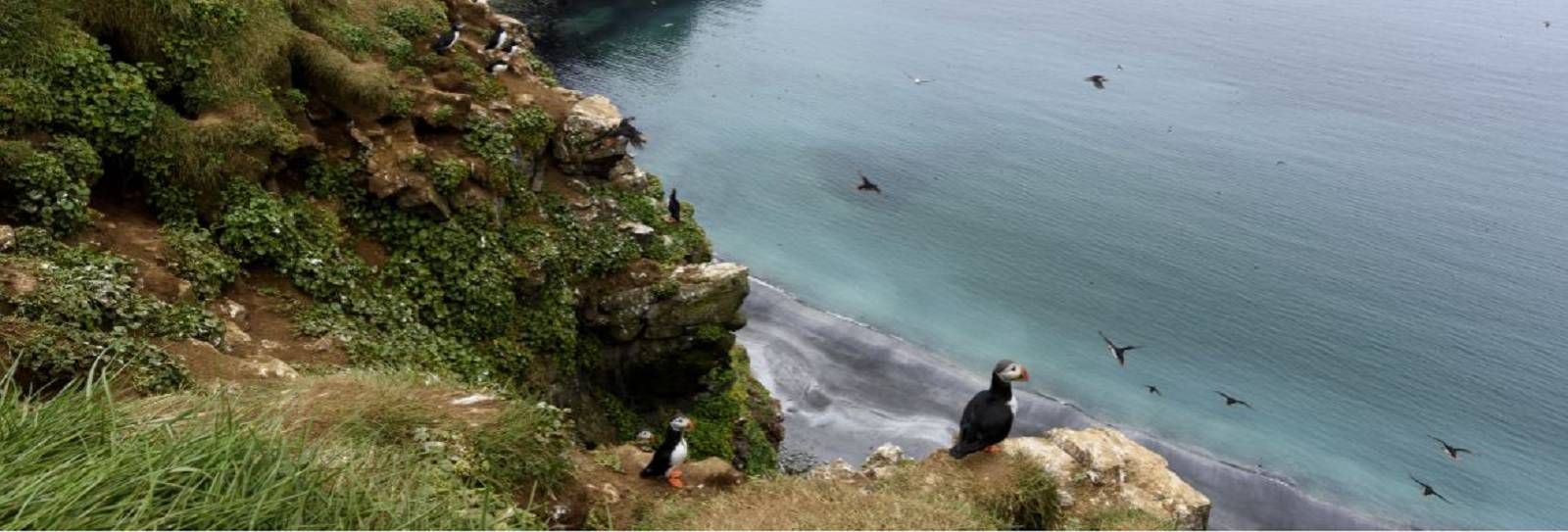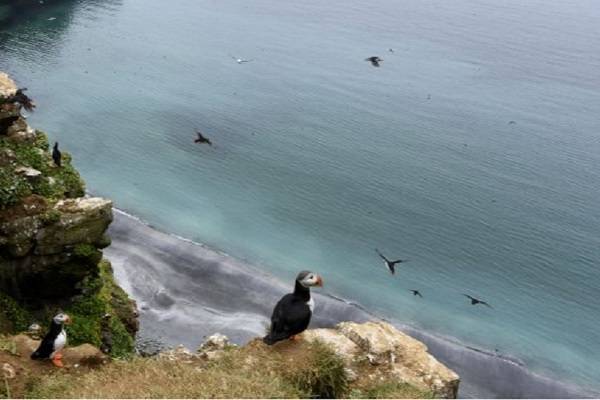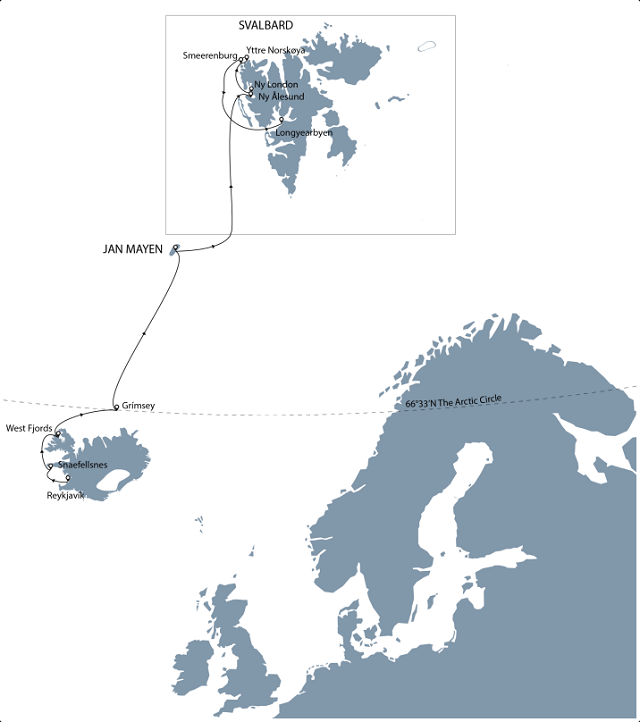HIGHLIGHTS
Iceland’s West Coast With Snaefellness
Northern Iceland's Rugged Coast
Siglufjordur And The Arctic Circle At Grimsey
Jan Mayen, At The Foot Of The 2200 Metre Beerenberg Volcano
Ny Ålesund And Ny London
Former Whaling Station At Smeerensburg And Ytre
Norskøya
Please keep in mind, the itinerary and outdoor activities during each
voyage are solely dependent on weather and operational conditions to
ensure the safety and quality of experience of our guests. The route
and shore landings will be determined by the captain and expedition
leader and communicated to guests through regularly scheduled
briefings. Albatros Expeditions reserves the right to modify the
landings and locations visited during a voyage based on weather and
local conditions and climate to ensure a safe and delightful experience
for all our guests and staff. Our trips are expeditionary in nature,
and thus changes to timings are common place due to the environment we
operate in as well as wildlife opportunities and locations.
DATES / RATES
Rates are listed per person
|
| Start Date | End Date | From EUR | From USD |
|---|
Rates are listed per person
|
| Start Date | End Date | From EUR | From USD |
|---|
ITINERARY
DAY 1
REYKJAVIK, ICELAND. WE EMBARK THE OCEAN ALBATROS.
Our journey begins in Iceland where MV Ocean Albatros is moored in Reykjavik. Boarding is in the afternoon, where the cabins are designated. After the mandatory security review and drill, we set our course north towards Iceland´s west coast.
DAY 2
ICELAND, THE WEST COAST. POSSIBLE LANDINGS AROUND SNAEFELLNESS WITH ZODIAC BOATS
In the morning, we sail along the 100-kilometre long peninsula Snaefellsnes, which with its dramatic cliff coast, hardened lava floods, sandy beaches and volcanic peaks, is a picture of Iceland in mini-format.
We round the nest on the peninsula and can enjoy the view of the nearly 1,500-metre-high snow-covered volcano, Snæfellsjökull, which was the centre of Jules Verne´s novel, "The Journey To The Center Of The Earth". The volcano with the almost perfect cone shape and the surrounding area became in 2001 the Snæfellsjökull National Park.
We will attempt a landing at Snaefellsnes.
In the afternoon we will pass Iceland`s westernmost point and the huge bird cliffs of Latraberg.
DAY 3
ICELAND, THE WEST FJORDS. NORTHWEST ICELAND'S RUGGED COAST WITH ISAFJORDUR.
In the morning, we sail around Iceland`s rugged West Fjords, possibly into Isafjardardjúp to enjoy the view of the steep mountains and see the terrific aerobatics of the Arctic terns.
During the day as we leave Isafjardardjúp and sail towards the West Fjords, which always offer one unforgettable experience after another. We finish the day sailing along the coast of Hornstrandir, the northernmost part of the West Fjords. From here, there are only 300 kilometres to the eastern coast of Greenland. In 1975, the area was converted into nature reserves, and currently has some of the strictest rules to protect the peculiar and fragile nature. Along the coast, there are good opportunities to see whales and seals, and the mountainside is alive with the rich bird life. We continue as we pass Hornvik Bay, which is considered one of the most beautiful places in Iceland, where we can see two of the largest bird cliffs in Europe where millions of seabirds breed.
We continue along the northern coast towards Siglufjordur and Grimsey.
DAY 4
ICELAND, GRIMSEY. SIGLUFJORDUR AND CROSSING THE ARCTIC CIRCLE AT GRIMSEY
In the afternoon, we will have arrived at the island of Grimsey, which is located about 40 kilometres from the mainland and is the only part of Iceland with an Arctic designation. The Polar circle crosses the island at 66 ° 33 'N, and gives the island one full day of 24-hour sunlight every year in June.
Over 100 inhabitants reside in the little rocky island, all living close to the harbour in the only city on the island. The fishing banks in the surrounding seas make the economy flourish, the port is expanded, and there is a small airport with daily flights to the mainland and a school for the children. The island has been inhabited right back from the settlement of Iceland and is mentioned in the sagas as an important land, rich in fish and birds.
The seabirds far exceed the number of inhabitants on Grímsey, and bird cries can be heard 24 hours a day over the bright Arctic summer. Up to 36 different species breed on the island and have their nests on the rocks. One of Iceland´s largest tern colonies is here, and it is said that the runway must be cleared for terns before the aircraft can land.
We`ll attempt landing by Zodiacs to experience the local life and explore the island`s bird life.
DAY 5
AT SEA. ENJOY LECTURES ONBOARD EN ROUTE TO JAN MAYEN ISLAND
During our voyage, our lecturers onboard will make inspiring and enriching presentations about Arctic history and nature, wildlife and climatology.
DAY 6
ATTEMPTED SHORE LANDING BY ZODIACS ON JAN MAYEN, AT THE FOOT OF THE 2200 METRE BEERENBERG VOLCANO
Approximately in the middle of the North Atlantic lies the enigmatic volcanic island of Jan Mayen. And if not exactly in the middle, at least it is located precisely on the Mid Atlantic Ridge, the reason for its volcanic existence. And enigmatic it is, not only because of its isolation but also due to the almost perpetual clouds and fog that hovers above it. Jan Mayen belongs to Norway, and the mountain, Beerenberg is one of the higher of Norway`s 300 summits above 2,000 metres.
The island is inhabited by only 18 persons, running the meteorological station and the Norwegian Defense. We will try to go ashore at the narrowest part of the island, from either south or north, depending on the prevailing wind and surf. The volcanic origin is visible all over with cinder cones, lava flows and the Mount Fuji-like appearance of Beerenberg looming above.
DAY 7
AT THE SEA TOWARDS SVALBARD LOOKING FOR SEABIRDS, DOLPHINS AND WHALES
Listen to a lecture from our experienced expedition staff, see a film about Arctic nature, or go out on deck to catch glimpses of migrating birds and hopefully some whales.
DAY 8
SVALBARD IN SIGHT, IN SEARCH FOR WHALES.
We are getting closer towards the islands of Svalbard, but we will first spend some time southwest of the islands-around the continental shelf. This area is rich in krill and gives us the best chance of spotting whales feasting.
During the night the ship will sail north along the coast of Spitsbergen.
DAY 9
NY ALESUND AND NY LONDON
We enter the beautiful Kongs Fjord, renowned for its former mining settlement and captivating beauty. Our first destination is Ny Alesund-a scientific research centre situated even further north than Longyearbyen, though it can be argued whether this constitutes an actual town. Our captain will do their best to bring the boat close to the shore, allowing us to explore the area on foot.
Our next destination is the abandoned marble mining settlement of Ny London. It experienced a brief but eventful existence, beginning in a flurry of mining activity reminiscent of the Klondike Gold Rush before being crippled by wars and financial losses just nine years later. We can still see the remains of workshops, locomotives, and cranes that tell the story of the ambitious yet failed enterprise.
DAY 10
FORMER WHALING STATION AT SMEERENSBURG AND YTRE NORSKØYA
We have now entered North West Svalbard, which was declared a national park in 1973. The day could begin with a cruise in Danskergattet, looking for seals in Virgohamna, before crossing from Danskøya to Amsterdamøya to make a landing at Smeerenburg, the legendary whaling town of the 17th century. 200-plus men were living-and quite often dying-here in the heyday of blubber production.
There are several interesting places to visit in this northwestern corner of Spitsbergen. If conditions allow, we`ll make a landing on Ytre Norskøya, where whalers would have their lookout posts.
DAY 11
ISFJORDEN AND LONGYEARBYEN
Located on the west side of Spitsbergen, Isfjorden is the second-longest fjord of the Norwegian archipelago, Svalbard. At the fjord entrance stand Alkhornet and Daudmannsøyra, a coastal plain. Parts of Isfjorden is included in the Nordre Isfjorden Land National Park of Norway. It is surrounded by several large settlements in Svalbard, including Barentsburg, Longyearbyen (on the Adventfjorden) and Pyramiden.
We aim to have a final landing along the coast, before we navigate towards Longyearbyen. We might land at Longyearbyen by evening.
Remnants of former mining stations can be seen along the way.
DAY 12
LONGYEARBYEN, SPITSBERGEN. DISEMBARKATION
Early in the morning, the ship is at anchor outside Longyearbyen. After breakfast and farewell greetings to the expedition team and crew, disembarkation will take place.
 (Click image to view Ship details)
(Click image to view Ship details)
WHAT'S INCLUDED
INCLUSIONS
- 12-day/11-night cruise on Ocean Albatros in a shared
outside double stateroom with a private bathroom in the category chosen
- Flight: Longyearbyen-Oslo
- Local transport in Longyearbyen on day 12
- English-speaking expedition staff
- Near-port walks with the expedition team
- Nature hikes and Zodiac cruises per itinerary
- Information briefings and lectures by the expedition team
- Special photo workshop
- Full board on the ship
- Dinner drink package
- Free coffee, tea, and afternoon snacks on the ship
- Welcome and farewell cocktails
- Taxes, tariffs, and landing fees
- Digital visual journal link after the voyage, including
voyage log, gallery, species list, and more
EXCLUSIONS
- International flight to Aberdeen
- Extra excursions and activities not mentioned in the
itinerary
- Single room supplement and cabin upgrades
- Meals not on board the ship
- Beverages (other than coffee and tea and dinner-drink
package)
- Tips for the crew (we recommend USD 14 per person per day)
- Personal expenses
- Transfer to the ship in Reykjavik
- Travel, cancellation, and senior insurance
- Anything not mentioned under
’Inclusions’
LECTURES
Our primary focus is knowledge, and we apply this to every aspect of a
journey. From the staff that forms our expedition team, to the routes
our ship follows, and of course, the program onboard.
PHOTOGRAPHY
We always have a dedicated expedition photographer onboard to document
the voyage and share their passion for photography through lectures and
during landings and zodiac cruises.
WILDLIFE OBSERVATIONS
One of the greatest pleasures of our expeditions, is being able to
experience the Polar regions' wildlife from a safe distance,
respectfully enjoying their beauty in their natural habitat.
ZODIAC
Essential for expedition cruises, Zodiacs are robust boats that can go
up on a beach, a rocky outcrop, a river bank or even an ice floe push
through bergy bits of ice floating in the water. This is definitely
one...







